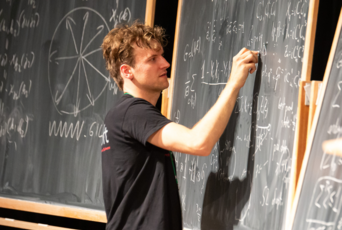
A Summer Journey into Motivic Homotopy Theory: Insights from PCMI 2024
This year, 184 participants from 17 countries travelled to Park City, Utah to attend the latest iteration of Park City Mathematics Institute (PCMI), an annual outreach program of the Institute for Advanced Study that has been active since the 1990s. The topic explored by the 2024 participants was Motivic Homotopy Theory.
Understanding motivic homotopy theory first requires an appreciation of two key components: homotopy theory and algebraic geometry. Homotopy theory is a branch of mathematics that studies shapes and spaces that can be continuously deformed but only without breaking or cutting them. To comprehend how this works in practice, picture a lump of malleable clay that you can manipulate by stretching, twisting, and bending, but not by tearing or rejoining. Homotopy theory examines the characteristics of shapes that remain constant when subjected to transformations that follow these rules. The second field, algebraic geometry, is another branch of mathematics that studies shapes, but these shapes are defined by equations. For example, a circle can be described by the equation x2+y2=1. Algebraic geometry looks at more complex shapes called “varieties” that can be described by more sophisticated equations.

Motivic homotopy theory functions like a bridge between homotopy theory and algebraic geometry, offering mathematicians the opportunity to better understand complex algebraic shapes by using the flexible tools from homotopy theory. The Institute is intimately connected with the history of this field. Key tenets of motivic homotopy theory arose out of the work of Fabian Morel, Member (2010, 2014–15, 2023–24) in the School of Mathematics, and Vladimir Voevodsky, Member (1992–93, 1998–2001) and Faculty (2002–17) in the School, in the 1990s.
At PCMI, motivic homotopy theory was explored over the course of an intensive three-week residential conference and summer school, which comprised several parallel sets of activities for different groups, encompassing the entire mathematical community. The Research Program component offered advanced scholars already engaged in research on motivic homotopy theory the opportunity to further their research, collaborate with their peers, and meet outstanding students. Meanwhile, Graduate Summer School participants attended a sequence of eight short minicourses delivered by leading experts, which provided an introduction to some aspects of motivic homotopy theory, as well as a taste of developments in other fields that have been influenced and enabled by the theory. Undergraduate Summer School students also attended a series of lectures to introduce them to some basic ideas in algebraic topology. They worked through an experimental mathematics component with open-ended problems and computational exercises focused on the topic of stability. The Undergraduate Faculty Program, designed for faculty from undergraduate-facing colleges and universities to reengage with the research community, surveyed “operads,” which are gadgets that encode certain types of mathematical structures. Operads have numerous applications from algebraic combinatorics to homological algebra and topology.

Beyond the specific academic programs tailored to each group, PCMI also offers cross-program activities that provide opportunities for participants from different groups to interact around the subject matter. Planned social activities generate further interaction, which can lead to new collaborations, mentorship opportunities, and, more broadly, a chance for participants to better understand those working in different areas of the world of mathematics.
PCMI 2024 was organized by von Neumann Fellow (2023–24) Benjamin Antieau, now based at Northwestern University; Marc Levine of Universität Duisburg-Essen; Oliver Röndigs of Universität Osnabrück; Member (2000, 2004–05) and Visitor (2002) Alexander Vishik, now based at the University of Nottingham; and Kirsten Wickelgren of Duke University.
Video lectures from this year's program can be viewed on the PCMI YouTube channel.
PCMI received major funding from the Simons Foundation and National Science Foundation and generous support from the Clay Mathematics Institute Senior Scholar Program.


